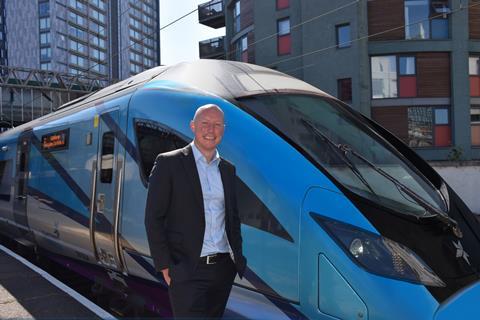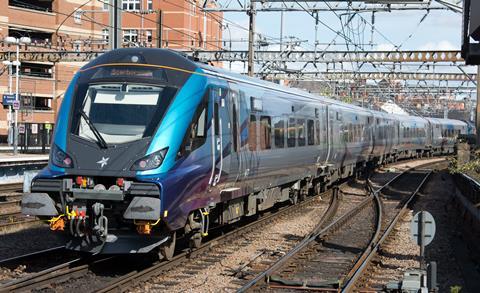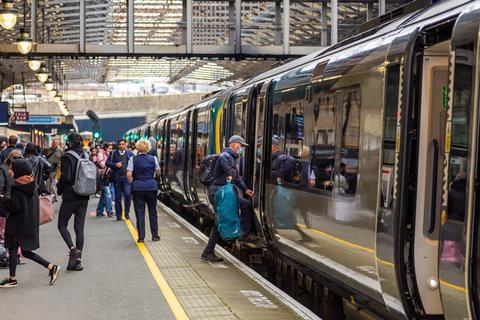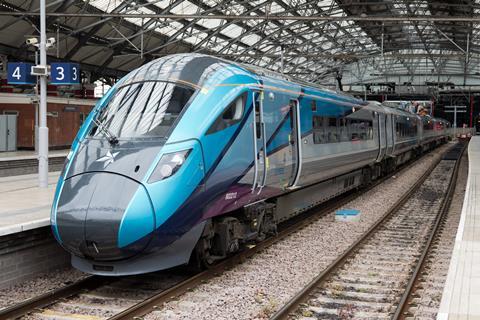
UK: State-run operator TransPennine Express has set out plans to address many of the problems that have caused significant disruption for passengers across northern England over recent years.
The improvement plan is set out in a document entitled Making Journeys Better: A Prospectus, launched in Leeds on October 19. Its publication follows TPE’s transfer from FirstGroup ownership to the government’s Operator of Last Resort, DOHL. Since the transition, DOHL and TPE management have been conducting an in-depth review of the company, noting that a priority was to simplify many of its operations.
Newly appointed as permanent Managing Director of TPE, Chris Jackson launched the prospectus by insisting that ‘we are starting a new chapter, with plans now in place to deliver a more reliable, punctual and dependable service across the towns and cities we connect’.
TPE says that significant changes are to be made to ensure trains run on time, giving passengers ‘the best possible journey experience in its stations and on its trains’. The plan has three sequential phases:
- Stabilising the operation to deliver better reliability and punctuality by December 2024;
- Re-engaging with its customers, colleagues and stakeholders between now and December 2027;
- Transforming TPE’s network through innovation and investment in better facilities by December 2032.
The reliability drive is helped by the recent agreement with drivers’ union ASLEF to reinstate Rest Day Working, after which cancellations reduced by 40%. Crew training has also been stepped up in order to address issues around route and traction knowledge; a backlog of 5 000 training days has already been reduced to 3 000, which Jackson says has already delivered tangible benefits. A year ago, only 50% of drivers at each depot signed all the routes and traction covered by that facility; that share has now reached 70%, with the trend still improving, Jackson said.
‘We’ve worked to rebuild relationships with trade union representatives and have resolved many of the local disputes that were so disruptive for so long, and we’ve delivered improvements and upgrades to some of our key stations’, he explained.
Costly and complex

A number of outstanding challenges remain regarding staffing and operations, Jackson acknowledged.
TPE is understood to have some of the most complex and restrictive trade union agreements of any operator, and there is a consensus that these have played a key role in hindering efforts to prevent train cancellations over recent years. These T&Cs are expected to be the focus of future discussions, when the company will seek to ‘re-engage with colleagues’, Jackson said.
On the operational side, TPE had already announced its intention to withdraw its Class 68/MkVa Nova 3 push-pull formations from the December timetable change, reducing its fleet from four train types to three. The push-pull sets are understood to be costing TPE almost £40m/year in leasing charges, while being more than three times more expensive per vehicle mile to operate than the average for its other fleets.
Fewer services

However, the quest for reliability in the short term means that from December, TPE will operate a reduced timetable, particularly on its North TransPennine route where three trains per hour will run off-peak and four during the peaks; this compares to a standard pattern of six trains per hour through Huddersfield in its pre-pandemic timetable.
West Coast Main Line services from Manchester Airport and Liverpool to Glasgow and Edinburgh will continue at the current level, although this is also a reduction on the pre-Covid service provision.
Jackson reported that these plans had been accepted ‘reluctantly’ by stakeholders, including regional mayors, Rail North and DfT. TPE plans to increase services again from December 2024 with an expectation that some additional trains may be reinstated before then if sufficient progress is made in driving up reliability and resolving staffing issues.
Meanwhile, more talks are planned between industry partners over TPE’s role in providing local services in the Manchester – Huddersfield – Leeds corridor; these all-stations trains are a marked contrast from its inter-city operations linking destinations as far afield as Liverpool and Edinburgh, many of which run on the same Trans-Pennine route. The decision to transfer these local services from Northern to TPE was taken by the Rail North partnership of DfT and local authorities during franchise remapping in 2016. At the time it felt that a single operator on the route would be more efficient, but in practice they add complexity to operations as TPE does not have driver depots in Huddersfield or Leeds.
Driving up income

Another key focus of the plan is driving up revenue. TPE says several short-term initiatives are to be introduced, including ‘a ticket sale to thank customers for sticking with TPE and to encourage others to travel by rail’. A programme of onboard aesthetic improvements is also to be rolled out, mainly targeting the Class 185 DMUs dating from 2005-06. These will include toilet improvements, and replacement of seat fabrics and carpets as well as an interior deep clean.
However, the financial outlook of the business remains stark: TPE currently costs £500m a year to operate but receives only around £250m in farebox income. Getting a grip on costs whilst driving up revenue will therefore be at the forefront of the recovery process, the company adds.
‘For years TPE was known for outstanding customer service and reliability — we will return to that position. Our ambition is to ensure that, from buying a ticket to leaving the station at the end of a journey, our customers have the best experience possible’, Jackson emphasised.



